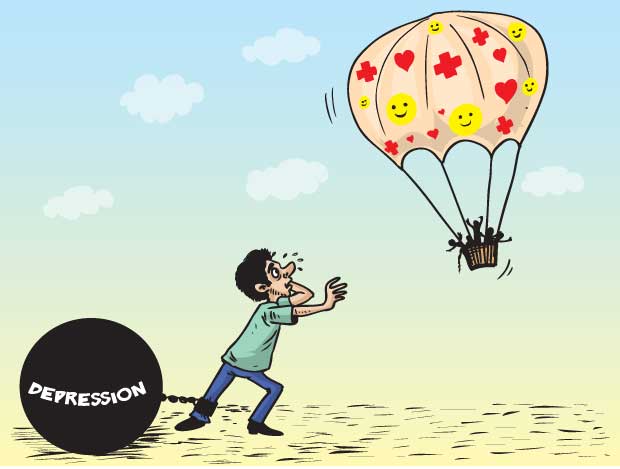Reply To:
Name - Reply Comment
Last Updated : 2024-04-24 10:25:00
Although our own medical officers have threatened to go strike again, tomorrow April 7, is World Health Day with this year’s theme being, “Depression: let’s talk”. In this stress-filled era some globalization dimensions, which are of highly competitive if not throat-cutting, depression has risen to the top as one of the main causes of ill health.
The World Health Organisation (WHO) in a statement gives us much to deeply think about when it says that depression is the leading cause of ill health and disability worldwide. According to WHO’s latest estimates, more than 350 million people including 800,000 in Sri Lanka, are now struggling with depression, an increase of more than 18% between 2005 and 2015.
The lack of support for people with mental disorders and a fear of stigma, prevent many from accessing the treatment they need to live healthy and productive lives.
Launching a year-long campaign against this depressing crisis, WHO says its main goal is that more people with depression will seek and get help.
WHO’s Director-General Dr. Margaret Chan says these new figures are a wake-up call for all countries to re-think their approaches to mental health and to treat it with the urgency that it deserves. One of the first steps is to address issues coloured by prejudice and discrimination.
Dr Shekhar Saxena, Director of the Department of Mental Health and Substance Abuse at the WHO says, “The continuing stigma associated with mental illness was the reason why WHO decided to name its campaign, Depression: Let’s talk. For those suffering from depression, talking to a person they trust is often the first step towards treatment and recovery.”

WHO says increased investment is essential. In many countries, there is little or no support available for people with mental health disorders. Even in high-income countries, nearly 50% of depressed people do not get treatment. On average, just 3% of government health budgets is invested in mental health, varying from less than 1% in low-income countries to 5% in high-income countries.
WHO also points out that investment in mental health makes economic sense. Every US$1 invested in scaling up treatment for depression and anxiety leads to a return of US$4 in better health and ability to work, it says. Treatment usually involves either a talking therapy or antidepressant medication or a combination of the two. Both approaches can be provided by non-specialist health-workers, following a short course of training and using WHO’s mental health-gap action programme and intervention guide. More than 90 countries have introduced or scaled-up programmes that provide treatment for depression and other mental disorders using this Intervention Guide.
WHO warns that failure to act could be costly. According to a study which calculated treatment costs and health outcomes in 36 low, middle and high-income countries for the 15 years from 2016 to 2030, low levels of recognition and access to care for depression and another common mental disorder, anxiety, result in a global economic loss of a staggering one trillion US dollars every year.
The losses are incurred by households, employers and governments. Households lose out financially when people cannot work. Employers suffer when employees become less productive and are unable to work. Governments have to pay higher health and welfare expenditures.
For thousands of years the world’s major religions have taught us what medical science is confirming today. Worry, anxiety and fear are useless. They do not add a single moment to our lives but on the contrary reduce our lifespan. Most of us are aware of this but we continue to be great worriers. It would be great if we are warriors. But sadly most of us are worriers plagued by some 300 types of fears ranging from the hysterical fear of cockroaches to the fear of death. Besides medication and counseling we need to also seek divine power to liberate our minds from worry, mostly imaginary fears and anxiety.
We also need to act effectively to remove the stigma. For instance in Sri Lanka we regularly or irresponsibly use the word ‘Pissa’ (mad person) and are shy of any reference to Angoda because the National Institute of Mental Health is situated there. We need to be aware that we are more often hurt in mind than in body. Therefore almost all of us suffer from varying degrees of mental injuries or depression. On this basis if our attitude and approach change it will be a major step towards national mental health.

Add comment
Comments will be edited (grammar, spelling and slang) and authorized at the discretion of Daily Mirror online. The website also has the right not to publish selected comments.
Reply To:
Name - Reply Comment
US authorities are currently reviewing the manifest of every cargo aboard MV
On March 26, a couple arriving from Thailand was arrested with 88 live animal
According to villagers from Naula-Moragolla out of 105 families 80 can afford
Is the situation in Sri Lanka so grim that locals harbour hope that they coul